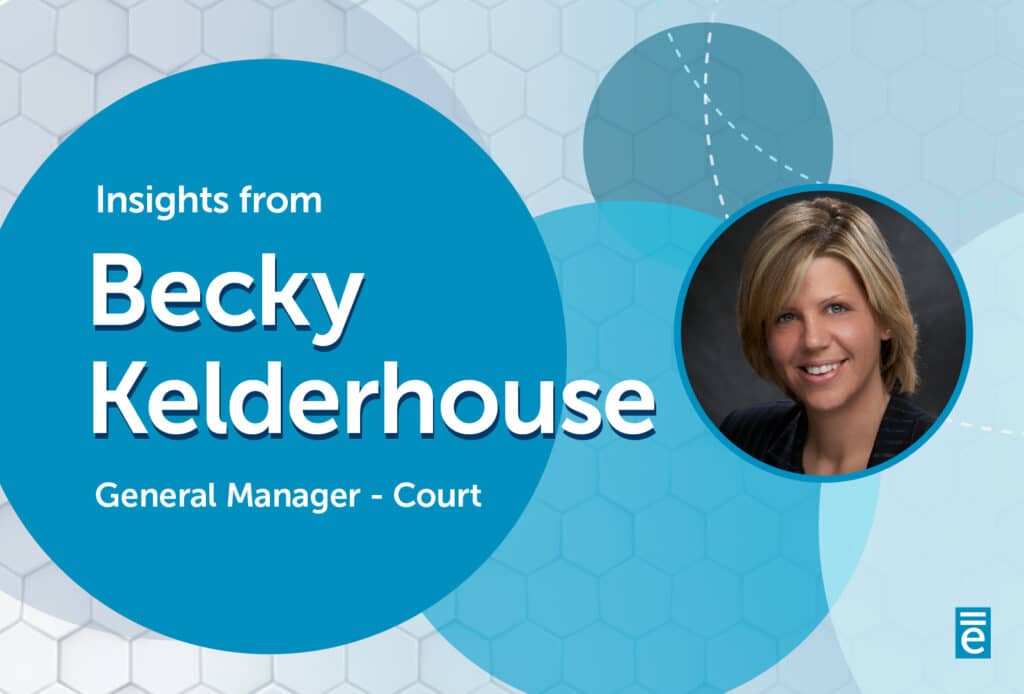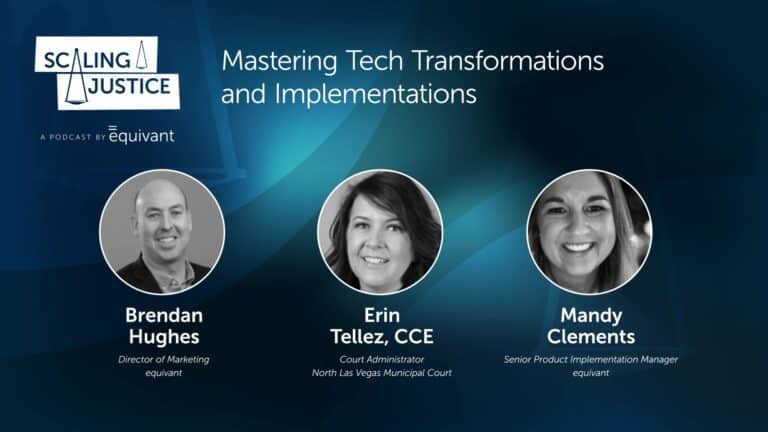We sat down with Becky Kelderhouse, former general manager of equivant, to talk about the impact of data and data sharing on the justice system. Kelderhouse has spent her career solving problems through technology, and she has worked at the intersection of justice and technology for the past 11 years.
“Data ties the whole justice machine together.” Becky Kelderhouse isn’t one to mince words: Data is essential in the justice system.
“Data is the foundational element that’s necessary to navigate our justice system,” Kelderhouse explained. “Everything is based on the quality and timeliness of the data, whether the right data exists and is tracked, and how it flows to the right person. Nothing moves efficiently or with integrity without the right data being in the right spot at the right time.”
The need for data in the justice system isn’t new, but the way data is gathered, tracked, managed, retrieved, and shared has changed substantially over time.
“We used to have to know which data point was on which piece of paper in which folder in which file cabinet in which football-field-sized storage facility,” Kelderhouse said. “That’s where technology has really made an impact. It’s not just saving costs; it’s saving time.”
Time is also essential to the justice process. As Kelderhouse explained, one of the most important ways courts can serve their communities is to make the justice process efficient and transparent.
“Nobody wants to be engaged in a long court case, and the courts don’t want it to be a painful experience either,” Kelderhouse said. “Both groups want the same thing. Getting court cases through to disposition efficiently and accurately are two of the biggest positive outcomes for a community, and courts can do that when they’re effectively managing their data.”
One of the biggest data management challenges courts face is sharing with other agencies. According to Kelderhouse, data sharing continues to be difficult for many courts, although two things are helping to mitigate these challenges: industry collaboration and technology solutions.
The National Center for State Courts convened stakeholders, including technology companies, to create the National Open Court Data Standards, or NODS, and that has been a game-changer,” Kelderhouse said. “Not only that, but justice technology companies collaborate with each other every day. We may be the vendor managing a court’s CMS (case management system), and that jurisdiction might have another company’s ODR solution, and we need all of it to integrate seamlessly.”
In addition to justice technology companies collaborating with national stakeholders and each other, it’s also important that companies like ours are building solutions that help courts share data with their partner agencies. For equivant, that’s IJIS Integration and Data Broker.
“The first time I saw a demo of the integrator, I thought it was brilliant. Probably one of the coolest things I’ve seen in this space,” Kelderhouse said. “The front-end interface allows customers to build their own integration points in real-time with an easy drag-and-drop function. I haven’t seen anybody else doing this.”
Kelderhouse said IJIS Broker/Integrator is one example of a solution that has evolved over time to meet ever-changing industry needs.
“The broker wasn’t a sexy solution by any stretch, but the integrator has evolved into this really incredible solution,” Kelderhouse said. “It’s extremely powerful and allows our customers to define what they want to do and how they want it done. They can create their own interfaces and then manage and update them at will without having us step in as the intermediary. We’re still here for help and support, but they don’t have to rely on us for every little change.”
The other solution that can help courts make great strides in data accessibility and transparency is JWorks, a case management tool for courts and attorneys.
“The real power of JWorks is the flexibility around the data piece,” Kelderhouse said. “Other CMSs in this space have limitations around pulling data back out, being able to quickly search and find what is needed. You have gigabytes and gigabytes of information to sift through to find the one piece of critical information the user is looking for.”
JWorks is different because customers can design their own screens, reports, and exports to surface the data points that are important for them and their workflows.
“Data accessibility in JWorks is very robust,” Kelderhouse said. “When a customer says, my team needs to see these specific data points in real-time, JWorks can do that. It’s all fully configurable and easy to use.”
So, does equivant (or anyone) have the data-sharing problem completely solved? No, not yet.
“Data sharing today remains the most significant challenge,” Kelderhouse said. “We’ve made progress, and in some ways, we’re really seeing change happen quickly. Even five years ago, things were still very siloed in most jurisdictions, but now we’re seeing that justice agencies want to come to the table, and they want to work together on this. We’re moving in the right direction.”
Want to learn more? Contact equivant today.





